

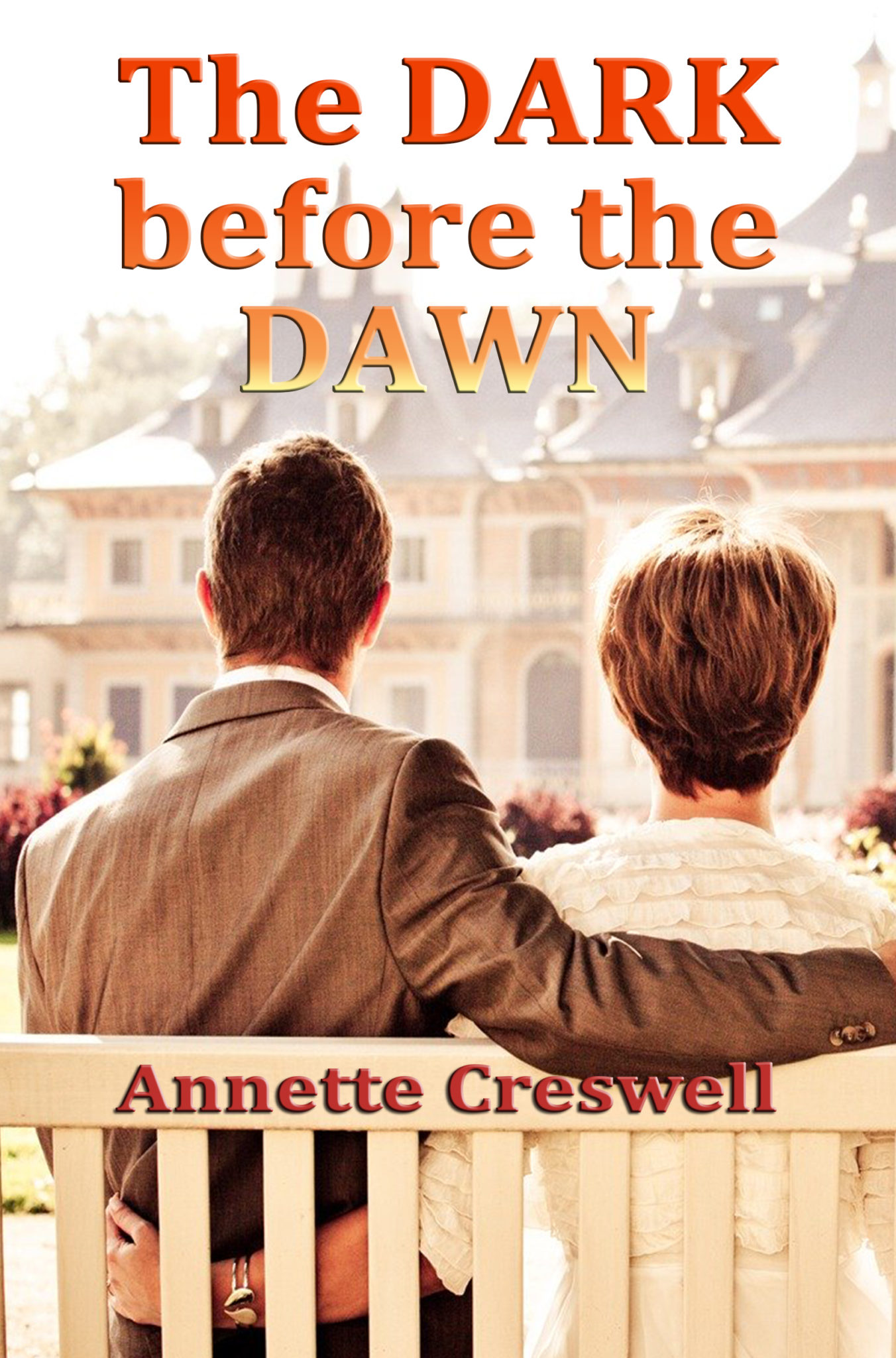
Listen to one of the chapters from Annette Creswell’s The Dark before the Dawn, a love story shortly before the start of World War II. The Dark before the Dawn is available here in our bookstore, on Amazon and in fine bookstores everywhere.
Synopsis
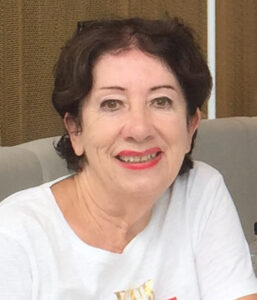
Author Annette Creswell
Just before the start of World War II, Peggy Davis, a London midwife, has a chance encounter with a stranger that changes her life forever.
When Peggy meets Charles, a wealthy lord as she boards a bus in front of Harrods department store, fate casts them together.
When Charles’ wife, Diana, and first child die in childbirth, Peggy, and Charles are thrust into a relationship of happiness, sorrow and unexpected tragedy.
They ultimately marry, have a son and adopt an east end refugee boy from London.
What transpires is a web of family dramas a la Downton Abbey with lesbian relationships, Nazi sympathizers and family secrets revealed as Peggy attempts to navigate through her new life from midwife to lady of the manor.
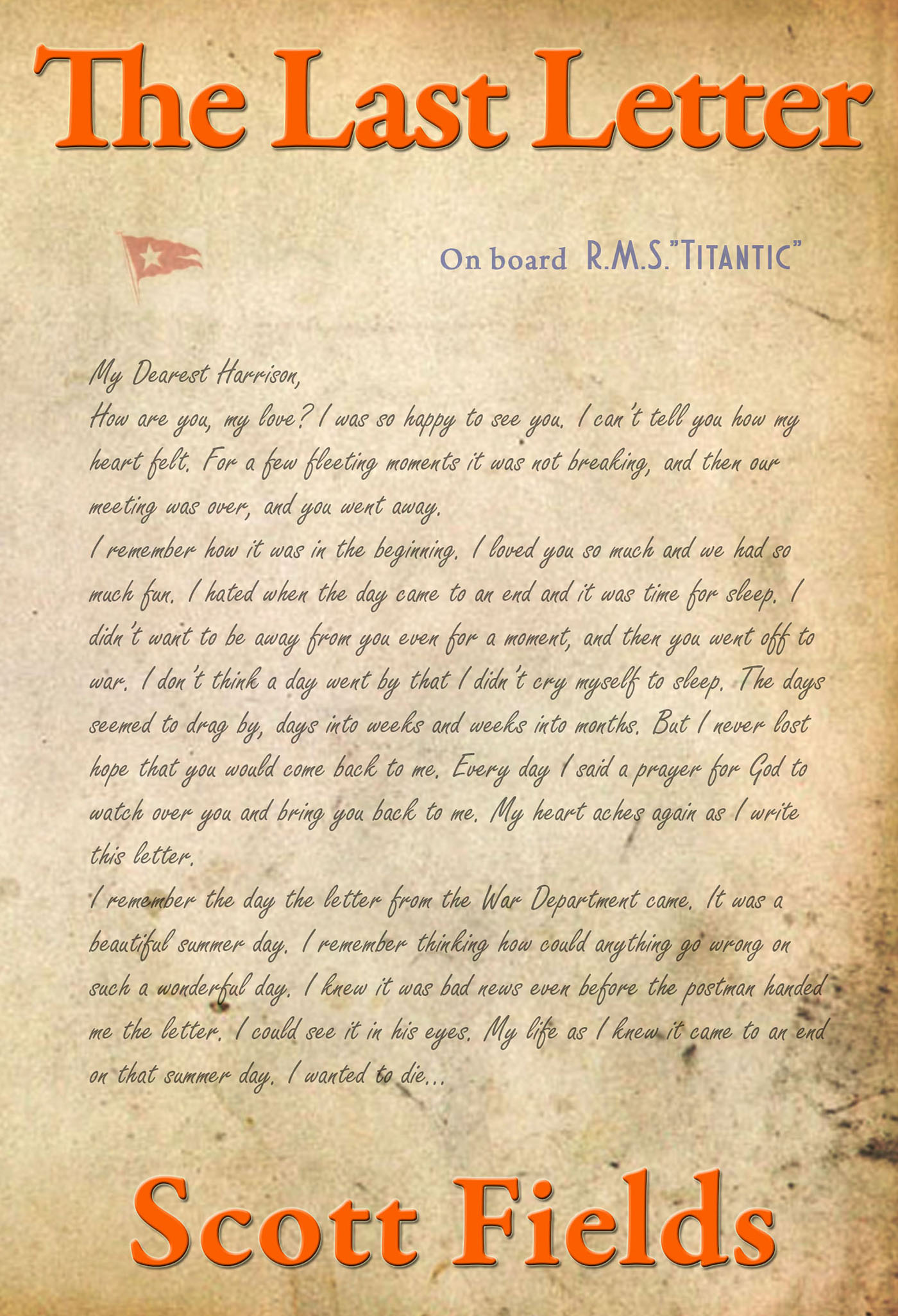
From her watery grave at the bottom of the Atlantic Ocean, the Titanic, even today, guards secrets of the past.
A woman, reportedly died that fateful night when the Titanic sunk, and yet she lived until the year 1995. Why did she feign her death all those years ago, and now after she’s gone, why is she trying to send a message to the living?
This is the untold story about the Titanic that has been kept secret for over one hundred years.
THE LAST LETTER is novel about two people drawn together by the hand of a woman that neither had ever met. Together, they set out to fulfill the unconsummated relationship of two people who met and fell in love over one hundred years before.
5.5″ x 8.5″ (13.97 x 21.59 cm)
Black & White on White paper
232 pages
Outer Banks Publishing Group
ISBN-13: 978-0990679073
ISBN-10: 0990679071
BISAC: Fiction / Romance / Paranormal
|
|
|
|
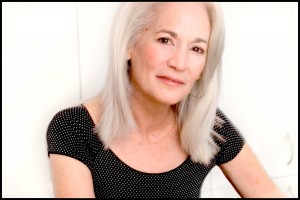
Outer Banks Publishing Group author Mary L. Tabor’s literary novel, Who by Fire, won the Notable Indie award for best books in 2013 by online magazine Shelf Unbound.
Shelf Unbound’s second annual writing competition had over 1,000 entries with 100 titles chosen as winners, according to Shelf Unbound’s publisher, Margaret Brown.
Mary’s book was featured in the December-January 2014 special edition of Shelf Unbound magazine (Page 35).
“Thanks to the Internet, artists can be discovered by a global audience-and in some cases even be funded by philanthropic strangers. The challenge, of course, is the discovery part-how do the indie artist and the indie audience find each other? That’s what this special issue of Shelf Unbound-honoring the winner, finalists, and notable entries in our second writing competition for best indie book-is all about,” wrote Ms. Brown.
Congratulations to Mary for her notable achievement!
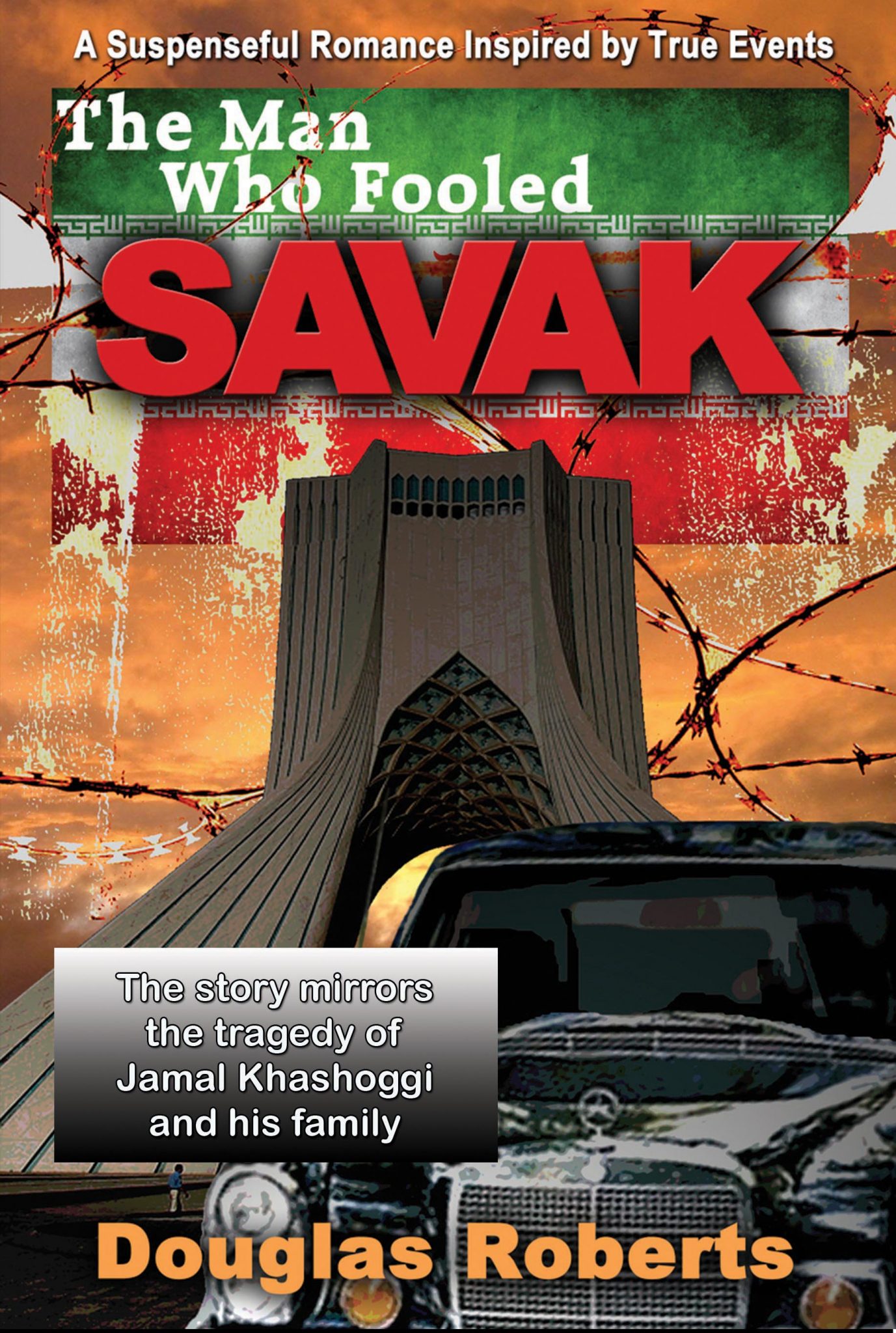
Inspired by true events in the early 1970s, The Man Who Fooled SAVAK captures what it is like to live in a dictatorship with secret police monitoring your every move – an atmosphere of fear that still pervades today in many countries in the Middle East.
Order your copy at a special publisher’s discount price of $12.99, list is $15.99.
Just click on our Bookstore tab and then click on Fiction.
We decided to reprint this interview with Douglas Roberts about what inspired him to write such a book. The interview was originally published June 19, 2011.
_______________________________________
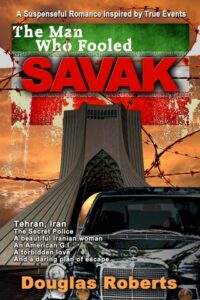 When Doug Roberts approached us with his manuscript, The Man Who Fooled SAVAK, it was one of those stories that completely engrossed you where you couldn’t put it down until it was finished.
When Doug Roberts approached us with his manuscript, The Man Who Fooled SAVAK, it was one of those stories that completely engrossed you where you couldn’t put it down until it was finished.
Inspired by true events in the early 1970s, The Man Who Fooled SAVAK captures what it is like to live in a dictatorship with secret police monitoring your every move – an atmosphere of fear that still pervades today in many countries in the Middle East.
What makes Doug’s book so appealing is that what he wrote today about events 40 years ago is still going on today in many parts of the Middle East. And all of these events are carefully woven into a love story that will make you fall in love all over again.
Q. The release of your book coincides rather well with Arab Spring. When did you start writing it?
A. In the summer of 2008. A woman I’d met on line named Erica Murray was interested in Iran so I started writing to her about it. I started doing some very preliminary research into the history and politics of Iran in 1971 in order to refresh my memory of things I had experienced when I was in Iran during that time. The book was completely finished several months before the uprising in Tunisia.
Q. Even though that was 40 years ago, there are many common elements with what is happening across the Arab world.
A. Yes, especially the fear people experience when living under an autocratic regime is something I hope I have captured, and as the book proceeds, the breaking out of that fear. Perhaps it will give people hope. Just like in my book, the methods used by various dictatorial regimes to maintain control seem to be taken from a common playbook: trample a free and independent press, keep the people fooled, use an iron fist to silence dissent, eliminate fair trials, use torture to extract confessions – the list goes on and on.
Q. But when you wrote the book, you weren’t thinking about that.
A. (laughs) True! I don’t have a crystal ball and the Arab Spring was as big a surprise to me as the rest of the world.
Q. Can I ask you about one of the characters in your book? Was there really a Junior?
A. Yes there was. I think Junior made the story possible to write. We really did sell our liquor and cigarette rations to him. I recently learned from a fellow who served in ARMISH/MAAG just before I arrived that Junior mostly dealt with the domestic workers, the Iranian nationals who worked at the bachelor quarters where we lived.
Q. I’d like to ask you about another character, Mihan Jazani. She is a historical figure, the wife of the Bijan Jazani who founded one of Iran’s guerilla movements. It appears that she’s a friend of yours on Facebook.
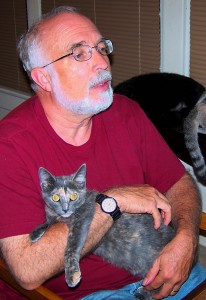 A. (Blushes) Um, well yes…so it would appear. (laughs) Actually, Mihan Jazani doesn’t like Facebook and never uses it. The Facebook account was set up for Mihan by her granddaughter, Aida. Aida and I exchange messages occasionally.
A. (Blushes) Um, well yes…so it would appear. (laughs) Actually, Mihan Jazani doesn’t like Facebook and never uses it. The Facebook account was set up for Mihan by her granddaughter, Aida. Aida and I exchange messages occasionally.
Q. How were you able to remember so much about what happened then? It was 40 years ago after all.
A. I was assisted in several ways. I had some writings I had done about Iran when I was in journalism school at Kent State in 1972. I had a large number of slides that I’d taken when I was there. Those were crucial in reviving old memories. A huge help was finding a 1977 map of Tehran on the (now defunct) Tehran American School website. I was able to use the exact names of places, even street names. The fellow I’d mentioned earlier who told me about Junior had sent me a copy of the ARMISH/MAAG directory, which was very useful. Finally, talking to people I worked with at that time was extremely important, namely Heidi Eftekhar and Barry Silver, who are characters in the story. I obviously couldn’t remember all events specifically, but I found I could generate them as needed by being very specific in my language. I would take seeds of ideas and extrapolate and grow them into full blown events. For example, a certain lecherous officer really did say to Heidi, “I think you’re a woman who needs a lot of loving.” I took that and ran with it. Last, but also important, the Internet was a valuable tool in researching the historical incidents in the book.
Q. So, where does the novel part come in?
A. Some of the human rights related events are novelized, but they’re very accurate in their portrayal of the times. I’ll leave historians to figure all that out. They will have their work cut out for them because I’ve spent a lot of effort weaving the story line into the history of those days.
Q. How close is your character Doug Roberts to the way you actually are?
A. That’s a really good question. (laughs) I had originally intended that Doug the character would be an extreme version of myself. But after having read my book now over and over, I’ve come to see that what’s extreme are the circumstances he’s in. Doug the character is a lot like I was back then: ok in the smarts department, and a little too cocky sometimes. He’s not very romantic or knowledgeable about women, but does all right in spite of himself. (laughs) There’s an element of male fantasy in the book I suppose. In the story, I have two charming female lunch companions in addition to Fari my Iranian girlfriend/fiancée.
Q. But you really were friends with Heidi Eftekhar your co-worker in the story.
A. I still am. Heidi and I communicate regularly by email and her input on the book was immensely helpful. Miss Farou is the fantasy. She actually didn’t like me all that much. (laughs).
Q. I get the impression you had a lot of fun writing your book.
A. It was pretty trippy for me at times. I would totally submerse myself in it. For example, I had written the scene describing how I spent New Year’s Eve in Iran just a couple of weeks after New Year’s Eve in real life. When someone asked me about how I’d spent my New Years, it shocked me as to how much effort I had to put into pulling up what I’d actually done versus what I’d just written. That was a little scary.
Q. What do you think people will get out of your book?
A. I’m sure everyone will get a little something different, but what I’d like for people to take from it is that, like in the story, life may present you with some extreme circumstances. When that happens, keep a level head and your wits about you. Try to see beyond what appears to be happening on the surface. There will always be some good things happening at any given moment. Try to focus on that. To get through your ordeal it’s a good idea to engage all your friends to help you and your faith if you have that. Most important of all: never give up.
The Man Who Fooled SAVAK is available as an ebook on Amazon Kindle and in various ereader formats from Smashwords.com
Outer Banks Publishing Group
ISBN-13: 978-0982993125
ISBN-10: 0982993129
BISAC: Fiction / Espionage
So you wanna get published, right? So you think only a big house can get you anywhere worth getting, right? So, you think you need an agent first thing, right? I thought all these things and have the credentials to prove that I’ve been on a literary journey: English major, Phi Beta Kappa, teacher, professor, MFA degree, literary journal editor, literary prize winner. But no big house and no agent.
Instead, I did what some may think is crazy. I went with a product development company that dabbled in publishing. But my book got out. And I went to work. I have an active public page that is linked to my account, a always under revision as new stuff happens and I write a where I try to post at least once a week.
Today’s post that you are reading would have been this essay. But this site begged for it and it’s theirs. But later you may see this post on my . Go check out this: .
I don’t tweet about my memoir (Re)Making Love: a sex after sixty story much, though some. I don’t blog about my book much, but some: actually, I blogged the book while I lived it—that’s the first crazy-some-say thing I did before the product development company found me—and that accounts for the banner of a blog that deals not with erotica but with literary thought, interviews and essays on writing and books.
Now you’d think a book with this sordid, unconventional history wouldn’t be doing very well, right? And, indeed, I’m not getting rich. But is that what we artists are really about? Okay, a girl could hope but that’s never been the goal: The work will out.
But get this: The small print in the visual of my book on Amazon says, #7 top rated in the Kindle store for Non-Fiction, Biographies & Memoirs, Arts &literature, Authors. The week before it was #5 behind The Diary of Anne Frank and Steven King’s On Writing.
And guess what: The book party at Upstairs on 7th (aka: “How to buy a dress and get a book party”) resulted in the promise of another book party by one of the women who came. Then I went to dinner with a banker-friend I know and told him what happened. He called his wife and is planning another book party in another dress shop and he’ll be providing the wine.
Is there a moral? Ain’t no good here at morals. But I will say this: If you put your heart and soul into your book and you’ve edited it like crazy with a cool eye, had others eyeball it and critique it, then find a reputable publisher and work—yes that means you—to sell one book at a time. Because like the memoir I wrote, it’s all personal.
PS: Another piece of good news: A new and much more experienced indie publisher has taken my memoir. Be sure to check out the second edition (more edits and a prologue) now from .
(Re)MAKING LOVE: a sex after sixty story, second edition, is available on , the , Barnes & Noble, the Nook, iBook, Sony ereader, the and in other electronic formats from .
When I heard this sad story on NPR radio this morning it moved me so much and reminded me of Doug Roberts novel, The Man Who Fooled SAVAK, a suspenseful love story based on true events. This is the kind of repression that still pervades a lot of the Middle East today as it did forty years ago when Mr. Roberts staged the successful escape of his fiancé and her mother from a repressive and threatening Iran.
In January of this year in Pakistan, the governor of Punjab province, Salmaan Taseer, who was an outspoken defender of civil rights, was gunned down for criticizing the hardness of Islamic law. He was merely sticking up for a Christian woman who was accused of blaspheming Islam. Her punishment: death.
His daughter, Shehrbano Taseer, is a journalist in Pakistan, and she talks to Steve Inskeep, host of NRP Radio’s Morning Edition, about her father’s legacy and her own fight against extremism.
Here is part of that interview:
“INSKEEP: And it was not that your father committed this alleged act of blasphemy, but merely spoke up for the rights of someone who was accused of blasphemy and asked for her to be accorded mercy. This is what many clerics described as itself being blasphemous.
Ms. TASEER: Yeah, because my father had criticized the law. He had criticized the misuse of the law.
INSKEEP: Did anyone speak up for your father after his murder?
Ms. TASEER: There were three people who believed that this law was being misused and that this was an unfair  allegation of blasphemy. There was my father. There was our federal minister for minorities, Shahbaz Bhatti, and there was Syeda Imam, who is a parliamentarian. And she had tabled a bill in the national assembly trying to water down this law and stop the misuse. And two out of three of these people are now dead. Shahbaz Bhatti, our federal minister for minorities, was gunned down outside his mother’s home two months after my father was shot dead.”
allegation of blasphemy. There was my father. There was our federal minister for minorities, Shahbaz Bhatti, and there was Syeda Imam, who is a parliamentarian. And she had tabled a bill in the national assembly trying to water down this law and stop the misuse. And two out of three of these people are now dead. Shahbaz Bhatti, our federal minister for minorities, was gunned down outside his mother’s home two months after my father was shot dead.”
You can read the rest of this moving interview or listen to it on the NPR site. And if you want to read more about a similar story with a much different outcome, download a copy of The Man Who Fooled SAVAK, available on the Kindle, Barnes and Noble NOOK, Apple iBooks and in various ereader formats from Smashwords.